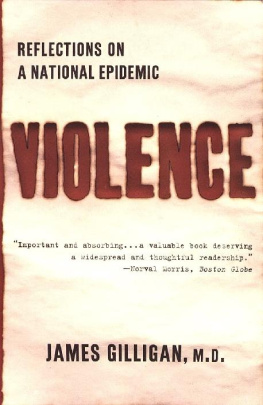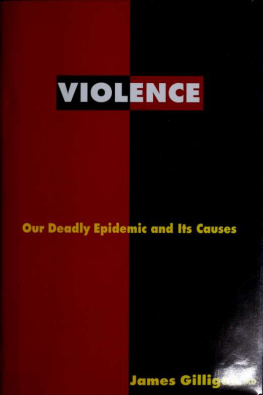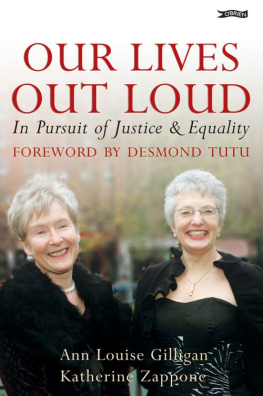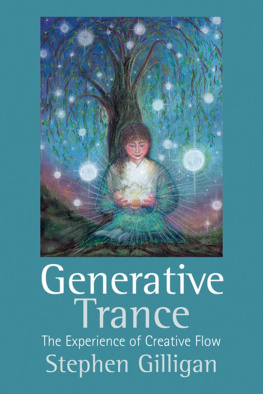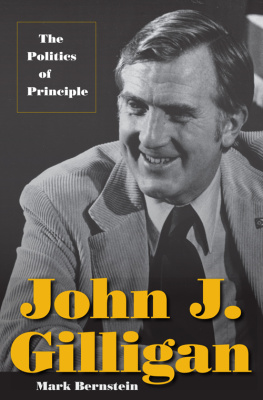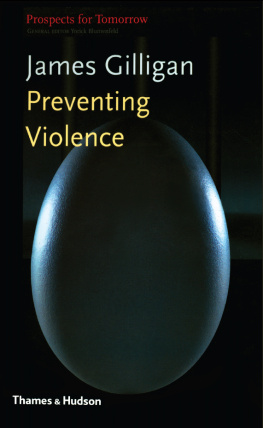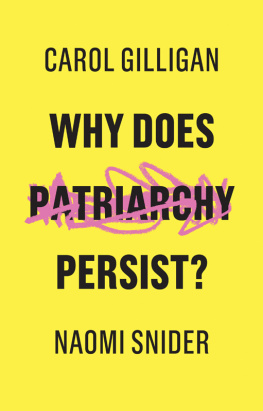This series, now edited by Gwen Adshead, takes the currently crystallising field of Forensic Psychotherapy as its focal point, offering a forum for the presentation of theoretical and clinical issues. It will also embrace such influential neighbouring disciplines as language, law, literature, criminology, ethics and philosophy, as well as psychiatry and psychology, its established progenitors.







Forensic Focus 18
Reflections on Our Deadliest Epidemic
JAMES GILLIGAN, M.D.



I
F A I T I
THE PATHOLOGY OF VIOLENCE
CHAPTER 1 29
CHAPTER 2 45
CHAPTER 3 57
P A I T I I
THE "GERM THEORY" OF VIOLENCE
CHAPTER 4 89
CHAPTER 5 103
P A K T I I I
THE EPIIEMIOLOGY OF VIOLENCE
CHAPTER 6 139
CHAPTER 7 163
CHAPTER 9 209
CHAPTER 10 225
The invention of nuclear weapons has changed everything-except
the way we think.... We shall require a substantially new
manner of thinking if mankind is to survive.
-ALBERT EINSTEIN
War, to sane men at the present day, begins to look like an epidemic insanity, breaking out here and there like the cholera or influenza, infecting men's brains instead of their bowels.
-RALPH WALDO EMERSON, MISCELLANIES (1884)
When a man is suffering from an infectious disease, he is a danger to the community, and it is necessary to restrict his liberty of movement. But no one associates any idea of guilt with such a situation. On the contrary, he is an object of commiseration to his friends. Such steps as science recommends are taken to cure him of his disease, and he submits as a rule without reluctance to the curtailment of liberty involved meanwhile. The same method in spirit ought to be shown in the treatment of what is called "crime."
-BERTRAND RUSSELL, ROADS TO FREEDOM (1918)
Violence is every bit as much a public health issue for me and my
successors in this century as smallpox, tuberculosis, and syphilis were
for my predecessors in the last two centuries.
-C. EVERETT KOOP, M.D., SURGEON GENERAL OF THE UNITED STATES (1984)
The deadliest form of violence is poverty.
-GANDHI
Of human beings: "None are good but all are sacred."
-GLENN TINDER, THE POLITICAL MEANING OF CHRISTIANITY: AN INTERPRETATION (1989)
I have set before you life and death, blessing and curse; therefore choose life.
-DEUTERONOMY 30:19



THE LAND OUT THERE IS SO VAST AND FLAT YOU COULD SEE THEM COMING all day, visible first as a single black speck suddenly appearing over the horizon, then differentiating into three figures silhouetted against the gunmetal-gray sky: Man, woman, and child slowly making their way, like ants crossing the Sahara, over the immense unbroken Nebraska/ Dakota plain called for good reason the Badlands. No markers to orient them, no boundaries to limit their wandering-nothing visible but grass and sky. A land before time and outside law-on they came across that millennial dreamscape, that ancient sandy sea bottom for a hundred million years that was still an ocean extending uninterrupted across the continent from the Rocky Mountains to the Alleghenies. Its boundless sandy floor was now covered by grass, not water, and they were adrift in the middle of that sea of grass until they spotted the first sign of human life-a thin spiral of smoke drifting tentatively toward the empty heavens from the ranchhouse, like a signal of distress sent up without much hope of rescue. A wisp of smoke curling like a question mark into the void where the only surprise would be getting an answer back, as if marooned, shipwrecked sailors had tossed a message in a bottle into the ocean without really expecting anyone to find it and then discover to their astonishment and chagrin that the only people who found it were just as lost and shipwrecked as they: a bearded French-Canadian fur trapper, his squaw from one of the tribes he had traded with, and their fourteen-year-old daughter who was forever after known not by her name but simply as the halfbreed. When they got there, they were fed and offered a bed for the night, as all travelers have been since the time of Odysseus, by the rancher. He was an immigrant who had not fled Ireland, that mockery of Eden, simply to starve in another famine. So his life was consumed by the battle of turning a continent of unwilling, unwelcoming sandy soil into a working ranch, figuring that if that sparse grass could support the tidal wave of buffalo who still flowed across the open prairie when he first arrived-covering it as the Milky Way blankets the night sky-then it could now feed as many beef cattle as he could breed in a lifetime of struggle, not so much with the cattle themselves as with the ragtag band of hired hands who only worked because he dominated them with his fists-a war against man and God so all-absorbing that it had simply not occurred to him yet to take a wife and start a family. But when the halfbreed arrived, he remembered what he had forgotten, and whenever he did make up his mind to do something he was too impatient to wait any longer than it took to get the thing done. So the next morning the furtrapper and his squaw went on their way over the opposite horizon leaving their daughter behind to be the Irish rancher's wife and bear his children-no family, no friends, no tribe-and over the years they had a child every year. But one-a five-year-old son-was her favorite, the child she cherished over everyone else on that unfriendly godforsaken earth.

